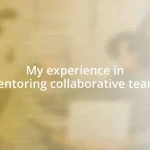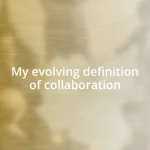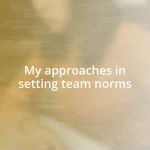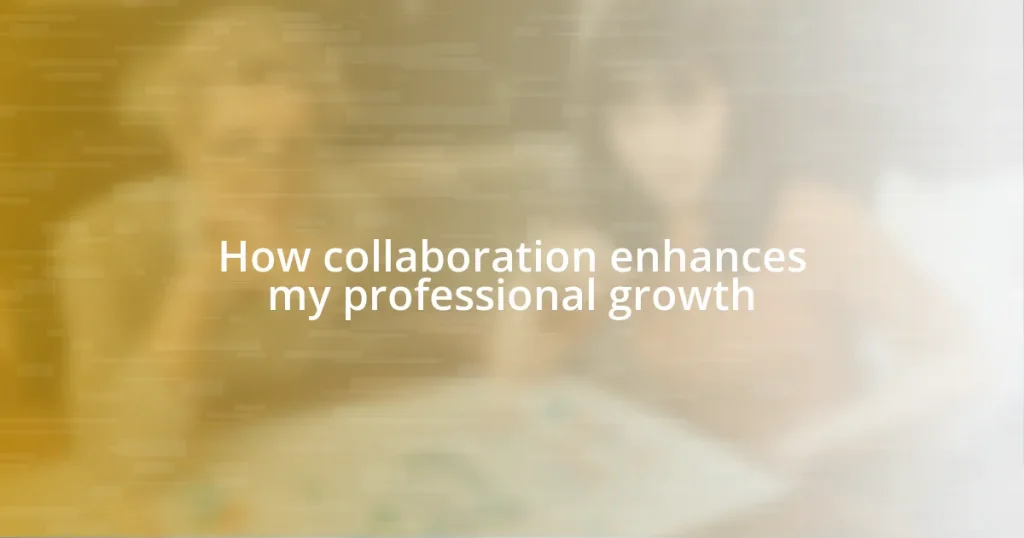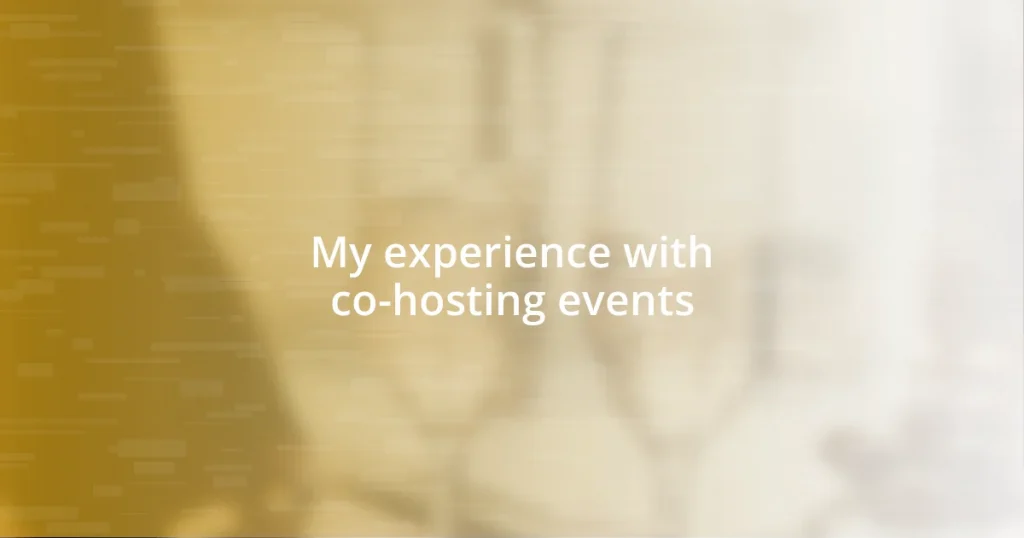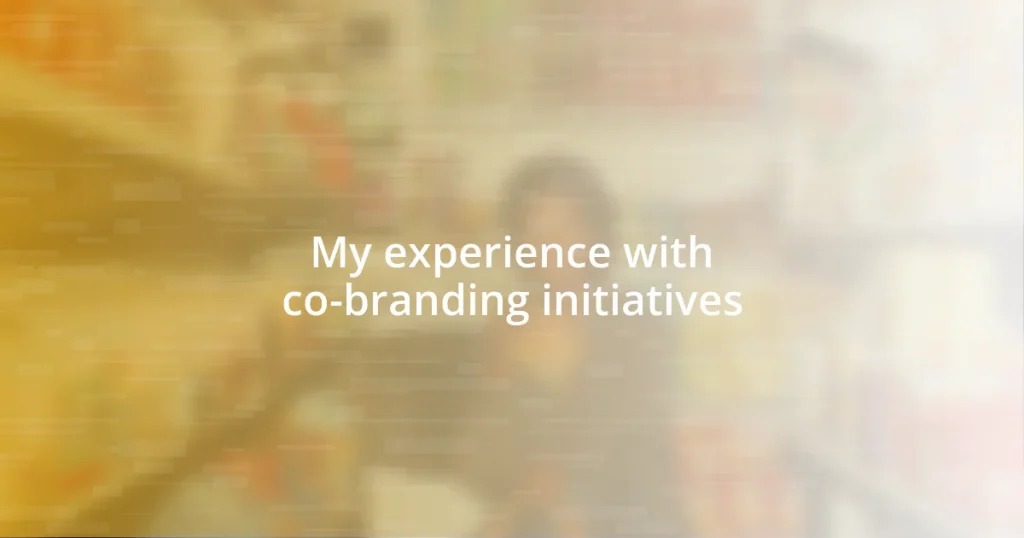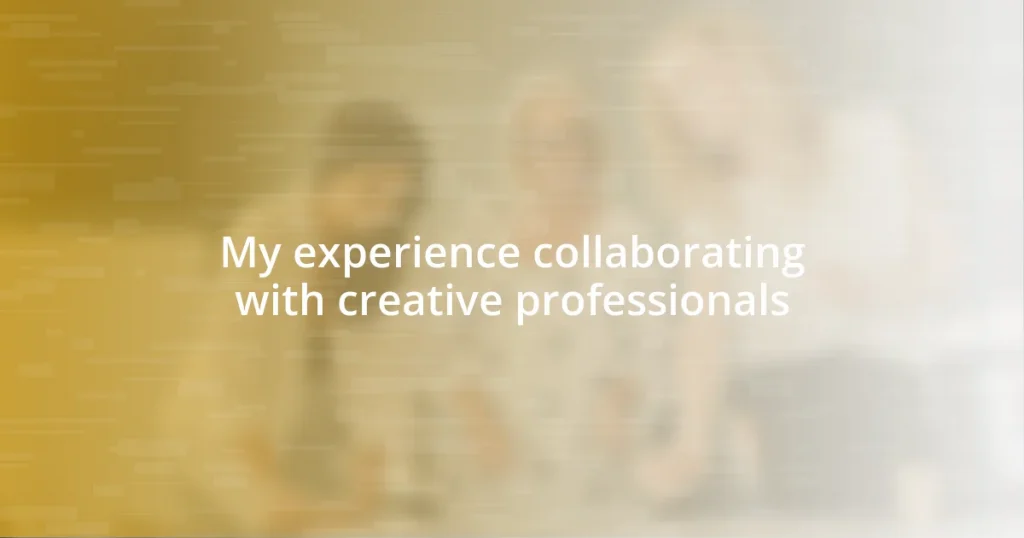Key takeaways:
- Collaboration enhances creativity, critical thinking, and emotional growth, and is essential for building resilient teams.
- Setting collaborative goals aligns individual strengths with team objectives, fostering a sense of ownership and accountability.
- Diverse perspectives in collaboration drive innovation and deepen empathy among team members, leading to richer discussions and solutions.
- Regular feedback and celebrating small wins cultivate trust and motivation, reinforcing the value of teamwork.
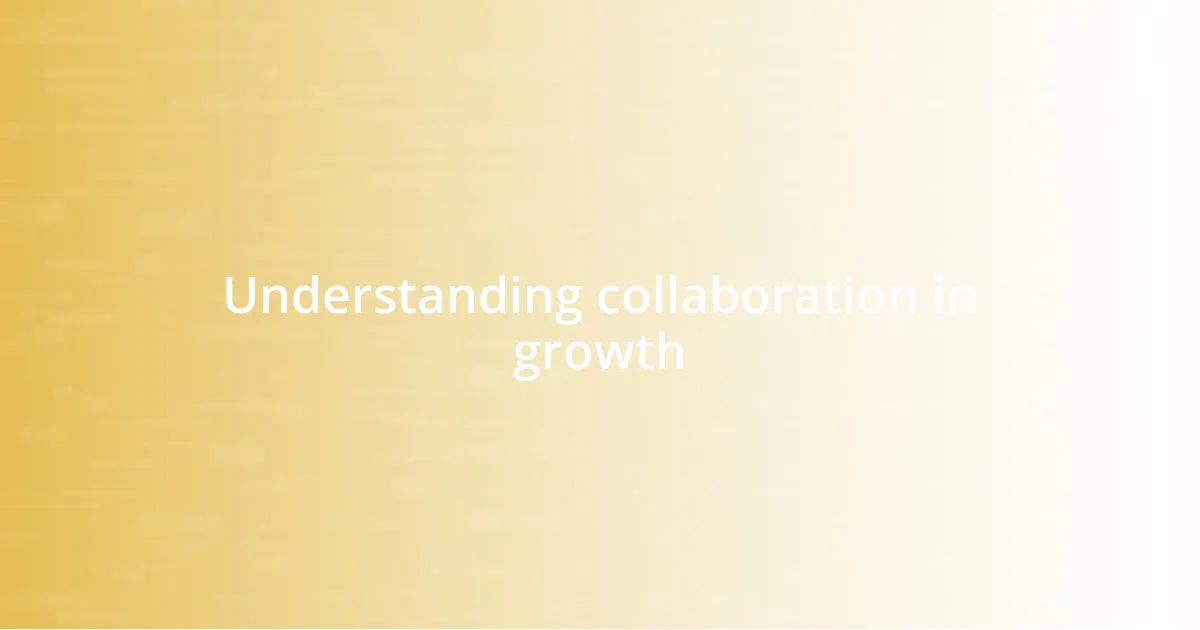
Understanding collaboration in growth
When I first began my career, I was surprised at how much collaboration could influence my growth. I remember a project where my colleagues and I shared different perspectives on a problem. This blend of ideas not only sparked creativity but also deepened my understanding, making me realize that collaboration is more than just working together—it’s about expanding our horizons.
I often reflect on what it feels like to bounce ideas off others. There’s something exhilarating about that moment of synergy when you’re in a room filled with passionate individuals. Have you ever experienced that “aha” moment when someone builds on your thoughts in a way you never expected? It’s a reminder that collaboration enhances our skills, pushing us to think critically and creatively.
This journey of collaboration also brings with it emotional growth. I recall a time when a friend in my network openly shared their struggles during a project. Their vulnerability allowed others to open up, creating a supportive atmosphere. It made me realize that growing professionally means not only sharing successes but also acknowledging our challenges together. Isn’t that what truly builds a resilient team?
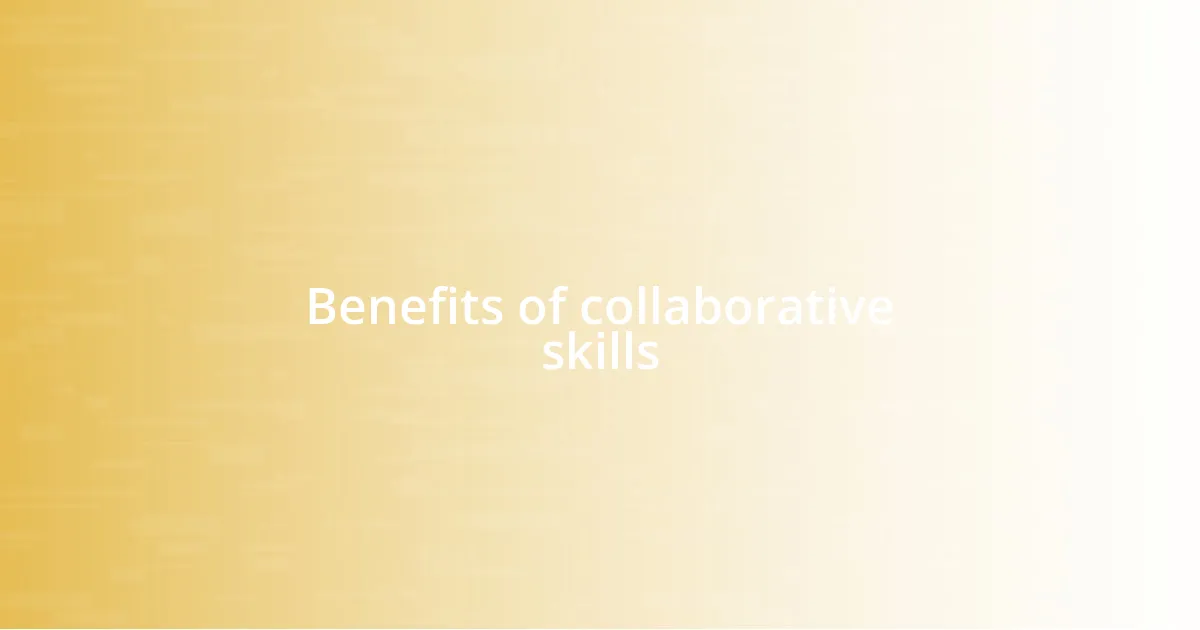
Benefits of collaborative skills
Collaborative skills offer many benefits that directly contribute to professional growth. One of the most significant advantages I’ve noticed is the way collaboration fosters innovation. When I collaborate with others, I often find that their unique perspectives help unlock new approaches to challenges I hadn’t considered before. For instance, during a recent brainstorming session, a colleague proposed a method I would never have thought of on my own, leading to a solution that impressed our entire team.
Furthermore, developing collaborative skills can enhance communication. I vividly remember a time when I was part of a cross-departmental team; our varied work styles posed challenges initially. However, as we navigated through our differences, we learned to articulate our ideas more clearly and listen actively. This mutual understanding not only strengthened our work output but also built lasting professional relationships that have proven valuable over time.
Lastly, engaging with colleagues in collaboration cultivates a sense of belonging and support, which is vital in today’s work environment. I recall joining a project where team members frequently celebrated small wins, fostering a culture of encouragement. This atmosphere not only motivated us to keep pushing our boundaries but also made me feel more invested in our shared goals, reminding me of the importance of working together for mutual success.
| Benefit | Description |
|---|---|
| Innovation | Different perspectives lead to creative problem-solving. |
| Communication | Improving clarity and active listening among team members. |
| Support | Encouraging a culture of acknowledgment and motivation. |
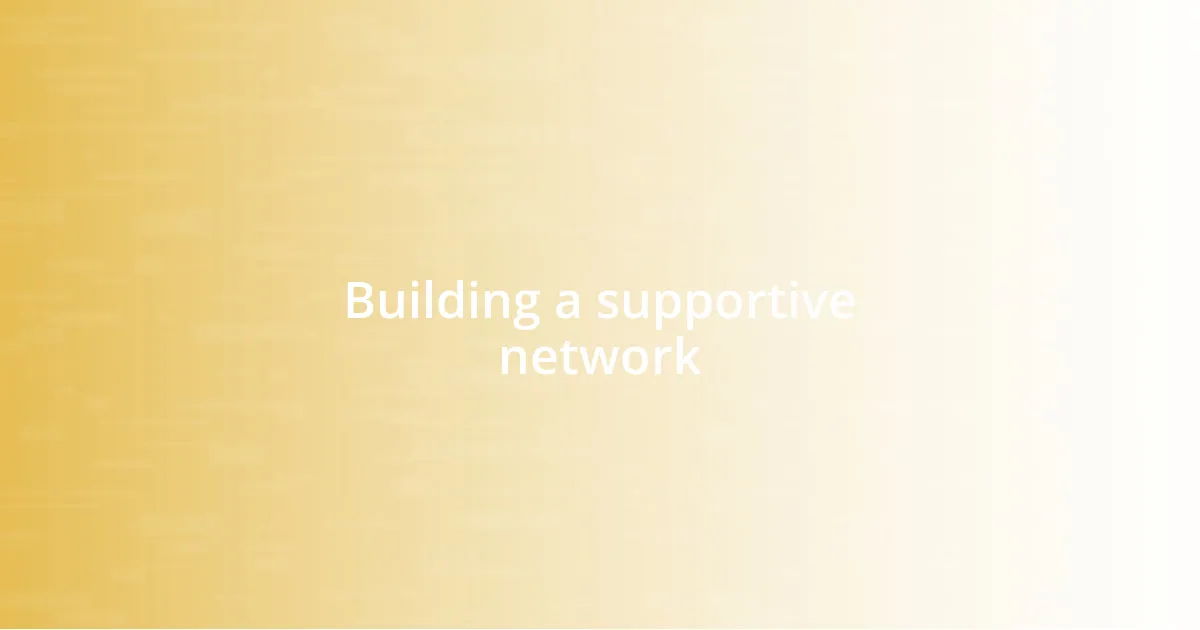
Building a supportive network
To build a supportive network, I’ve learned the importance of nurturing genuine relationships with colleagues. Over time, I’ve found that being open and approachable encourages others to share their experiences and struggles. I remember a networking event where I met someone who had faced similar hurdles in their career. Our connection sparked ongoing conversations that not only helped both of us grow but created a strong sense of camaraderie that felt invaluable.
- Trust allows for vulnerability, opening doors to honest feedback.
- Regular check-ins help maintain relationships and show that you care.
- Celebrating each other’s successes fosters a positive environment.
Creating a supportive network isn’t just about the number of connections; it’s about the quality of those connections. I’ve discovered that when I actively engage with my network, share knowledge, and show appreciation, it reinforces the bonds we’ve built. For instance, after working on a challenging project, I took the time to thank my teammates for their support, which not only made them feel valued but enhanced our collaboration in future endeavors. It’s these moments of recognition that truly enrich our professional journeys together.
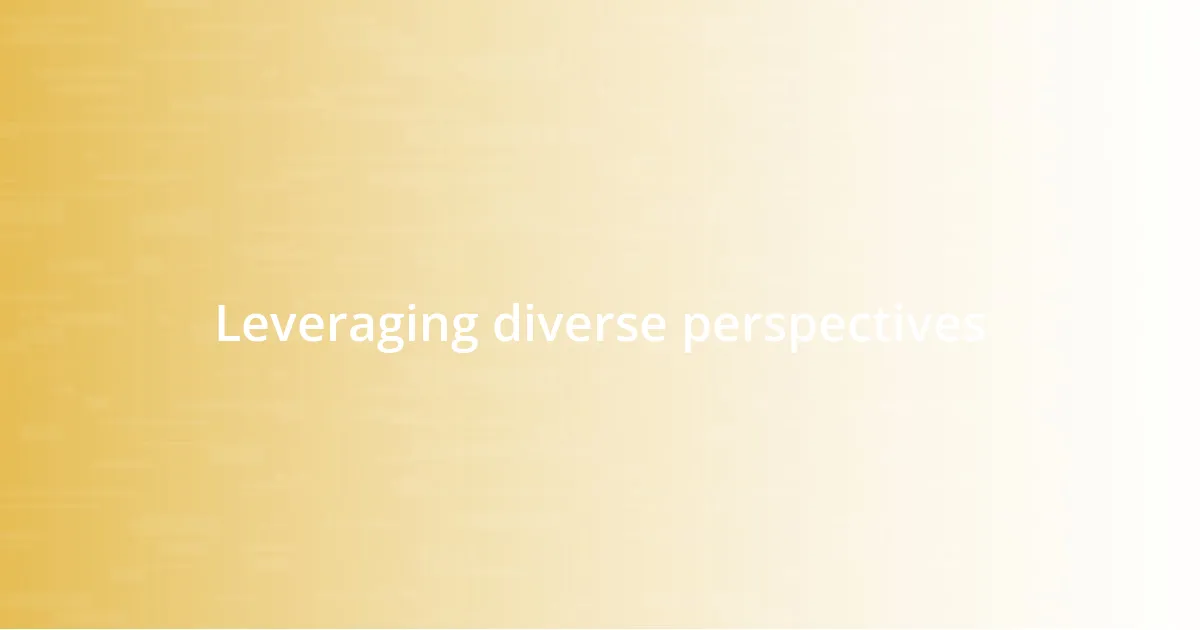
Leveraging diverse perspectives
When I think about leveraging diverse perspectives, I can’t help but recall a project where our team was tasked with developing a new marketing strategy. Each member brought different backgrounds and specialties, framing challenges in unique ways. I still remember the moment when one team member, who had a background in sociology, analyzed our target audience’s behaviors through a lens I was simply unaware of. This insight didn’t just alter our approach; it sparked a richer conversation that led us to a campaign idea that was both impactful and resonant.
I often wonder, how can we truly understand the full scope of a problem without tapping into the wealth of experiences around us? I’ve observed that when I actively seek out diverse viewpoints, it challenges my thinking and broadens my understanding. For example, during a recent meeting, I intentionally invited input from a junior colleague who initially seemed hesitant to speak up. When they finally shared their thoughts, it was an eye-opener; their fresh perspective introduced an innovative concept that not only improved our project but reminded me of the immense value in every voice around the table.
Embracing varying perspectives also nurtures a deeper sense of empathy among team members. I recall a time when a colleague shared their struggles adapting to remote work. Their candidness encouraged others to open up about their feelings, creating a space of understanding. This vulnerability made me realize that by valuing different experiences, we not only enhance our professional output but also forge meaningful connections, allowing us to grow both as individuals and as a cohesive team.
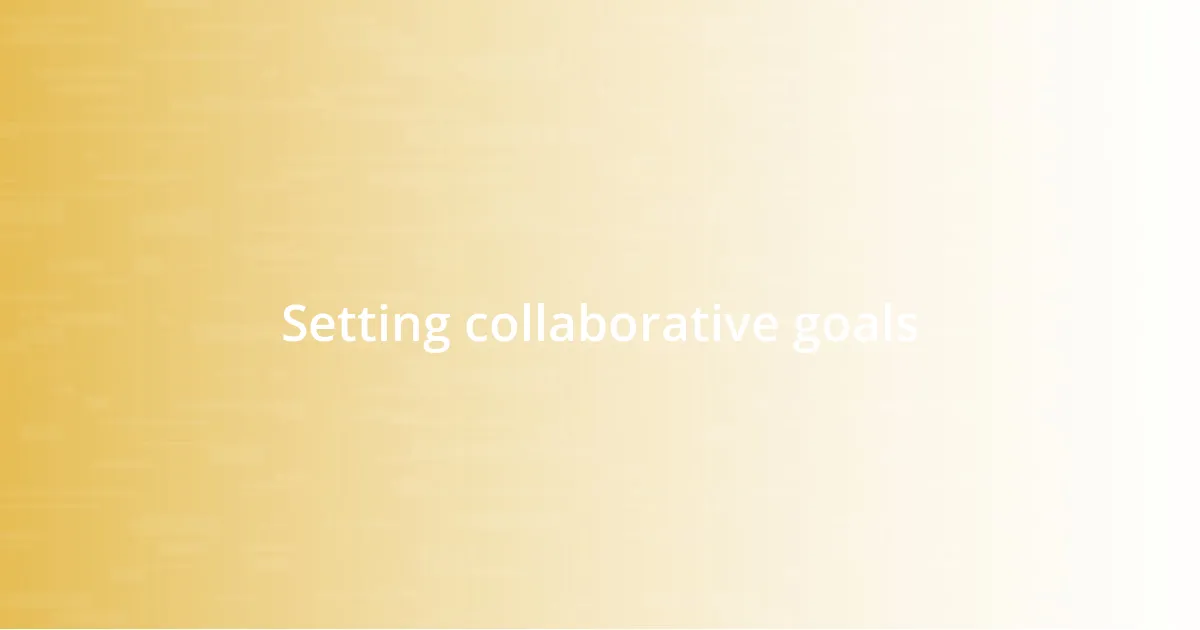
Setting collaborative goals
Setting collaborative goals is essential for guiding a team’s shared vision. When I embark on a project, I make it a priority to sit down with my colleagues and outline clear objectives together. I remember a time when, during a brainstorming session for a product launch, we established specific targets for each phase of our work. This collective approach ensured everyone was on the same page, fostering a sense of ownership and accountability.
One of the most powerful aspects of goal-setting in collaboration is how it aligns individual strengths toward a common aim. I often find it beneficial to encourage each team member to express their personal goals alongside our collective objectives. For example, in a recent team meeting, we all shared what we hoped to achieve through our collaboration, which not only unveiled hidden talents but also heightened our commitment to excel together. Have you ever experienced that moment of realization when everyone’s aspirations come together as a shared purpose? It’s truly inspiring.
Furthermore, regularly revisiting and adjusting these goals plays a pivotal role in maintaining momentum. I learned this firsthand after an ambitious project started feeling disjointed. When we gathered to assess our progress, we discovered we needed to tweak our approach. This openness to change and adaptability reenergized the team and reinforced the notion that collaboration thrives on flexibility. It really solidified for me that setting collaborative goals is not a one-time effort; it’s an ongoing dialogue that propels both individual and team growth.
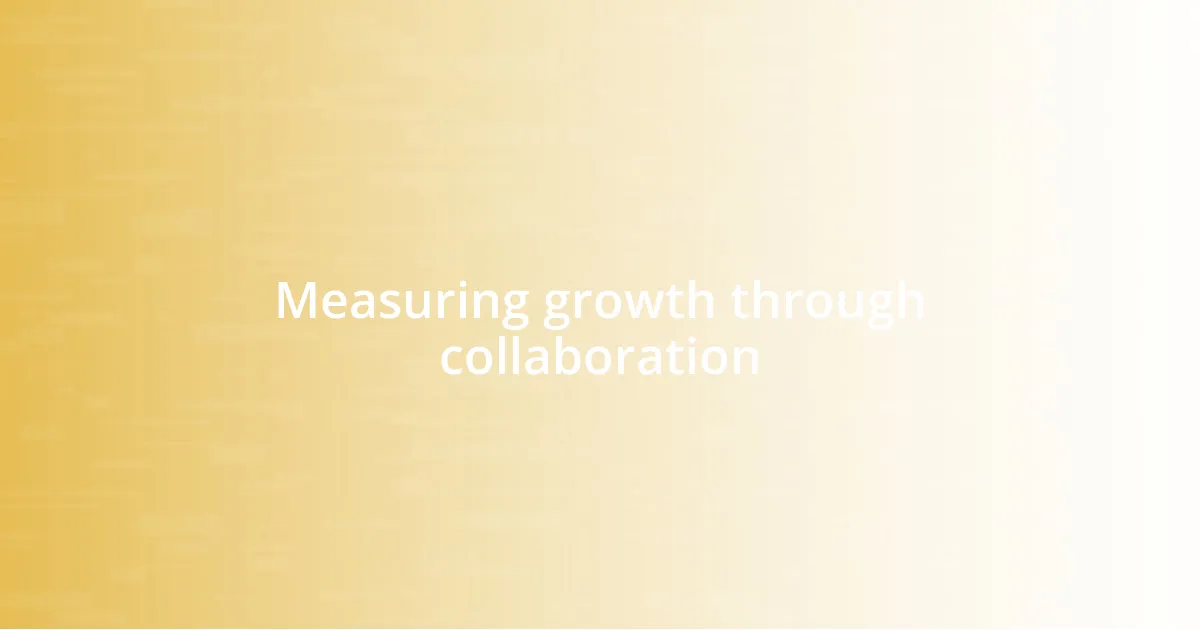
Measuring growth through collaboration
Measuring growth through collaboration can often feel abstract, but I’ve found that tangible experiences can really illuminate this process. For instance, after a collaborative project, I reflect on how each team member has evolved. I remember my colleague who initially struggled with public speaking; through frequent group presentations, we witnessed their confidence blossom. Isn’t it incredible how working closely with others can push us to tackle our own challenges?
Another important aspect of measuring growth lies in feedback. I once participated in a project debrief where we collected constructive feedback not just about the final outcome, but about each other’s contributions. That experience was eye-opening. I discovered strengths in my teammates that I hadn’t noticed before, and conversely, I received insights about my own participation that sparked a desire for improvement. Have you ever thought to assess not just the goals met, but how the journey helped you change?
Lastly, I believe that tracking collaboration outcomes through metrics and qualitative feedback enables us to visualize growth. After concluding a significant team project, we took time to assess not only our successes but also the lessons learned. I found it particularly striking how much I grew in adaptability and trust, evident by the way my team rallied around each other during challenges. Isn’t it powerful to see growth not just in skills, but in relationships forged along the way? This type of evaluation doesn’t just measure progress; it also highlights the richness of our shared experiences.
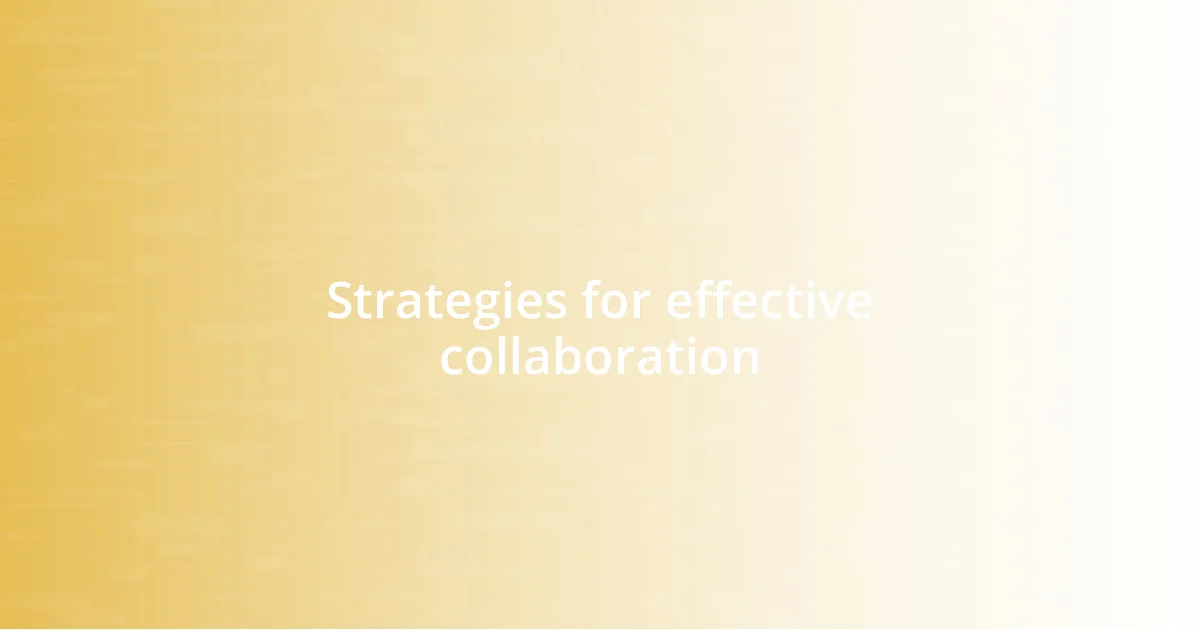
Strategies for effective collaboration
To foster effective collaboration, it’s crucial to create an environment where open communication thrives. I have found that regular check-ins can significantly enhance this process. In one of my past team projects, we instituted a weekly huddle, where everyone shared updates, challenges, and successes. This practice not only kept everyone in the loop but also built a foundation of trust. Have you ever noticed how transparent communication can transform team dynamics?
Another strategy that has worked wonders for me is leveraging diverse perspectives during brainstorming sessions. I vividly recall a project where we invited input from team members with varying backgrounds—some from marketing, others from technical roles. The result? A wealth of innovative ideas that we would never have uncovered in a homogenous group. Isn’t it fascinating how diversity can serve as a catalyst for creativity and problem-solving?
Lastly, I can’t stress enough the importance of celebrating small wins together. Whether it’s a shout-out in a team meeting or even a casual lunch outing to acknowledge progress, these moments nourish team spirit. I remember a time our group collectively achieved a milestone, and the team celebrated with a spontaneous pizza party. It felt great to know our hard work was recognized and appreciated. In your experience, how do you think celebrating achievements, no matter how small, impacts motivation and morale within a team?




